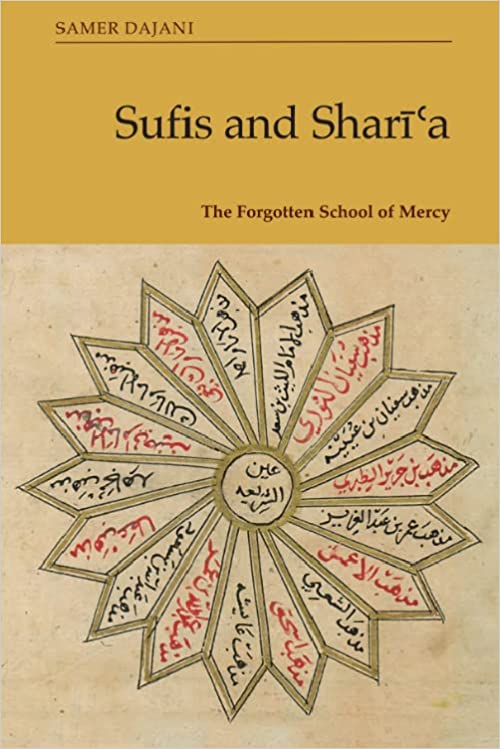Throughout the centuries, Muslim scholars have endeavoured to shape and implement the legal foundation of Islam, the sharīʿa. Many of these scholars were renowned theologians who sought to identify the theological implications of following a particular legal ruling or school. Sufi scholars were also on a similar quest, a quest which, however, focused on the spiritual apparatus and objectives of the sharīʿa.
In his latest book, Sufis and Sharīʿa: The Forgotten School of Mercy, Dr Samer Dajani (Cambridge Muslim College Research Fellow 2015-16) examines the key role of prominent Sufi scholars, such as Muḥyī al-Dīn Ibn al-ʿArabī (d. 638/1240), al-Ḥakīm al-Tirmidhī (d. 298/910), ʿAbd al-Wahhāb al-Shaʿrānī (d. 973/1565), and Aḥmad ibn Idrīs (d. 1252/1837), in establishing and reviving a pluralistic, mercy-oriented understanding of the sharīʿa. The study addresses key questions pertaining to the nature, structure, and scope of the sharīʿa in the lives of believers, considering both its outward and inward implications.
Key Findings

-
- Ibn ʿArabī favoured a hadith-based jurisprudence, one which primarily derived its teachings from the Qur’ān and well-established Prophetic reports. This was based on his recognition that reason-oriented practices such as legal reasoning (ijtihād) and analogy (qiyās) lead to an increase in legal rulings and obligations. Nevertheless, he did not completely reject these tools as, in his view, an authoritative jurist (mujtahid) either sought to expand restrictions or remove difficulty, the latter being closer to God on the Day of Resurrection, thus emphasising the God-given gift of ijtihād to the community.
- Sufi scholars highlighted that a true jurisprudence (fiqh) is ultimately wholly dependent upon the purity of one’s heart, thus adding a third dimension of personal insight and knowledge of God to the equation. Al-Tirmidhī characterises this dimension as wisdom or spiritual insight (ḥikma). Furthermore, his student, Muhammad ibn ʿUmar Abū Bakr al-Warrāq al-Ḥakīm (d. 280/893), illustrated the interdependence of theology, jurisprudence, and ascetism (kalām, fiqh and zuhd) and argued that only those who have mastered them all will prosper.
- The plurality of legal schools or madhhabs demonstrates Islam’s flexibility-oriented legal tradition where strict adherence to a particular school is, in the Akbarian tradition of Ibn ʿArabī and his successors, not compulsory. This approach is the fulfilment of the Prophetic practice of being a source of mercy and ease to the people. As al-Suyūṭī notes, previous prophets were sent with one ruling for each act whilst the final prophet at times taught varying rulings regarding the same act. This can explain much of the disagreements among the madhhabs, as sometimes their differences can be justified as being rooted in the options provided by God’s Messenger, upon him be peace, himself. Dajani shows that the view that differences among scholars is rooted in the sharīʿa‘s in-built flexibility was widespread in the time of the Followers (tābiʿīn).
- The sharīʿa is, in Shaʿrānī’s vision, like a tree where each madhhab is equal as each branch stems from the same source (ʿayn). Likewise, since the sharīʿa combines the stations of islām, īmān and iḥsān, (submission, faith and spiritual excellence), it accommodates different levels of physical and spiritual states and attainments. Each legal ruling may, as a result, incorporate a stringent or lenient option based upon the demand of the moment and a person’s state (hāl).
- One of Ibn ʿArabī’s eminent heirs in the later period, Aḥmad Ibn Idrīs, expounded upon the function of sharīʿa as not being merely driven by justice (ʿadl), but also by mercy (raḥma). He gives the example of the exchange between Prophet Solomon and his father David, in which the meritorious judgement was the one which brought ease and contentment to both parties, the claimant and the defendant.
Author’s Message
The legal tradition of Islam was one which, from its inception, promoted plurality and flexibility. Ibn ʿArabī’s thought and tradition has shown that such legal diversity was based on the notion of mercy, a notion articulated in the Qur’ānic verse: “He (God) has placed no hardship in your religion” (Q. 22:78).
Ibn ʿArabī and his prominent followers have demonstrated that both the traditionalist and the rationalist approaches can provide means to alleviate difficulty by allowing people to choose the easier or most suitable ruling based upon an individual’s circumstances. Yet, such legal allowance does not entail any kind of laxity or self-complacency. The Akbarian madhhab is thus considered an all-encompassing madhhab which, nonetheless, reminds its adherents to show mercy towards others, but steadfast rigour towards oneself.
Further Reading: Dr Dajani’s Essay ‘The Sharīʿa as Mercy and Grace’ .
 Dr. Samer Dajani has a BA in Arab & Islamic Civilizations from the American University in Cairo, and an MA and PhD in Islamic Studies from the School of Oriental and African Studies (University of London). He also received an Alimiyya degree from al-Salam Institute (London) and recently completed a postgraduate degree in International Business from Birkbeck University. He was a Research Fellow at Cambridge Muslim College in 2015-16 after which he taught as a lecturer at the Muslim College, London. He is the author of Sufis and Sharia: The Forgotten School of Mercy (Edinburgh University Press, 2023).
Dr. Samer Dajani has a BA in Arab & Islamic Civilizations from the American University in Cairo, and an MA and PhD in Islamic Studies from the School of Oriental and African Studies (University of London). He also received an Alimiyya degree from al-Salam Institute (London) and recently completed a postgraduate degree in International Business from Birkbeck University. He was a Research Fellow at Cambridge Muslim College in 2015-16 after which he taught as a lecturer at the Muslim College, London. He is the author of Sufis and Sharia: The Forgotten School of Mercy (Edinburgh University Press, 2023).

